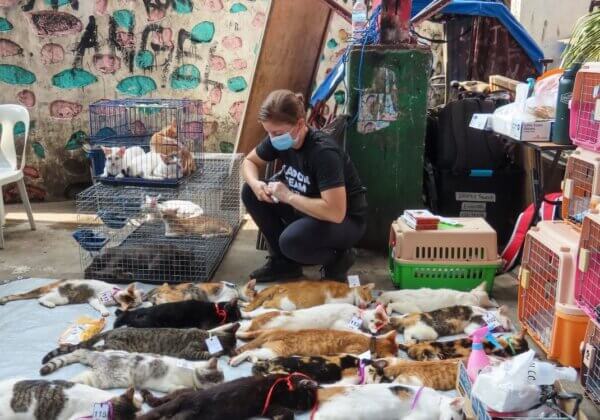Healthy Home-Cooked Vegan Meals … for ‘Man’s Best Friend’!
 Many vegans would like their animal companions to lead a healthy vegan life, and these days, there are a variety of vegan pet-food brands available at specialty pet stores and online. These foods should contain everything your cat or dog needs to be vegan.
Many vegans would like their animal companions to lead a healthy vegan life, and these days, there are a variety of vegan pet-food brands available at specialty pet stores and online. These foods should contain everything your cat or dog needs to be vegan.
But in some regions, finding affordable vegan food for dogs and cats is impossible—or prohibitively expensive. If this is the case for you, you don’t have to abandon the idea: There are other options!
A home-cooked vegan diet can meet all the nutritional needs of your companion animal, and it also eliminates exposure to commercial pet foods, which often contain too many chemical additives. Dogs and cats do not necessarily need meat to be healthy, but as with any diet, you must ensure that you are meeting all their nutritional requirements.
Don’t try to make the change to a plant-based diet all in one go. Your feline and canine friends may need time to adjust to this new diet, so it is best to add in an increasing amount of vegan food to their diet a little at a time. This way, they will have time for both their bodies and their minds to adapt to the new food.
For recipe ideas and tips on nutritional requirements, check out Vegetarian Cats and Dogs by James Peden. This book provides you with recipes and with valuable information on which supplements might help your newly vegan kitty or dog stay healthy. Follow the recipes carefully to ensure that you don’t miss ingredients that are essential to your animals’ well-being.
You will also need to be aware of foods that can be dangerous to your animal companions. Among other things, onions, macadamia nuts, chocolate, raisins, and grapes are all bad for dogs, and to the list for cats, we can add cow’s milk. Yes, that’s right—cats are not designed to drink cow’s milk, and they’re often lactose intolerant! This isn’t a full list, so please do your research before giving your friend a new snack, as you could do them more harm than good.
Treats that are good, healthy options for your newly vegan animal include apples, bananas, and watermelon for dogs (remove all seeds and pips first) and melon and cooked peas for cats. Make sure you keep a close eye on your animals’ health during this diet change because, while most animals will adjust well to a plant-based diet, some may not.
There’s no reason why your animal companion can’t live long, satisfying lives on a plant-based diet. One vegan dog, Bramble, a border collie, lived a record-breaking 27 years. So give your cats and dogs a chance at a healthy, meat-free life, and you may be pleasantly surprised by the results!
Posted by Claire Fryer









